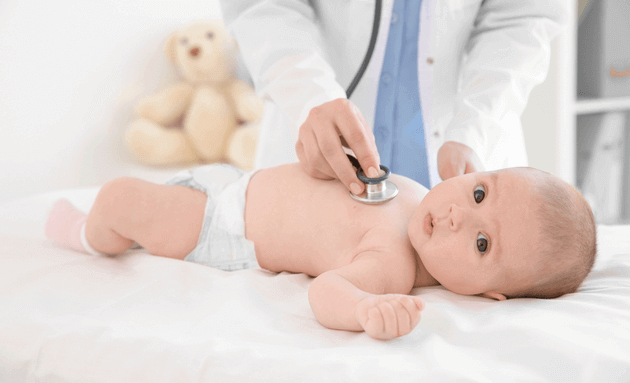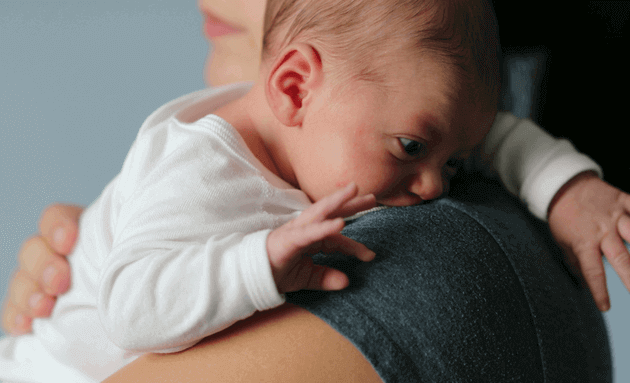Prenatal care is important for both pregnant women and their children. Prenatal healthcare assures the baby is born without any medical complications and ensures a healthy delivery for both mother and child. However, sometimes, a newborn may suffer from various health conditions that might cause respiratory distress and long-term lung diseases.
Breathing difficulties are common in newborns, where they have irregular breathing patterns that alternate between slow-paced and fast-paced, with irregular pauses.
However, make a note of your baby’s breathing noises and gauge what they sound like. It can be caused due to a number of reasons and is best to consult the doctor.
Why Is a Baby’s Breathing Different from That of Adults?

The lungs are the last organs of a body to develop. Their respiration isn’t fully learned, and their airways are smaller. They breathe through their nostrils more than from their mouths, thereby sounding different than adults breathing.
Typically, a newborn takes 30 to 60 breaths per minute.
This slows down to 20 breaths per minute while they’re asleep. They may also perform rapid breathing and then pause for 10 seconds. All this is different from that of an adult breathing, thereby alarming new parents.
When Should You Worry About Your Newborn’s Breathing?
Infant Breathing Disorders are a group of disorders that can affect your newborn’s respiratory health. It occurs when your baby’s lungs are not fully developed, especially if they’re born prematurely.
The different types of infant breathing disorders are
- Pneumonia caused due to infection at the time of birth. Premature babies have less developed immune systems and are prone to infections that can lead to chronic lung diseases.
- Meconium aspiration caused when your baby has their first stool but inside the womb. It may so happen that your baby inhaled meconium (the first stool of a mammal) right after birth that has lead to inflammation in their lungs.
- Respiratory Distress Syndrome, that is caused when the small sacs in your newborn’s lungs are not fully developed, resulting in collapse, making it difficult for them to breathe. It is most common in those born six weeks prematurely.
What Does Different Breathing Noises Indicate in Your Newborn?

The following are common breathing sounds in newborns that you should make a note of:
- Whistling Noise: This might be a cause of nostril blockage due to mucus.
- Hoarse Cry or Barking Cough: May be caused due to an inflammation or mucus blockage in the voice box or windpipe.
- Deep Cough: This may be a blockage in the airways, but an in-depth diagnosis may be necessary.
- Wheezing: This may be caused due to asthma, pneumonia, or respiratory tract infections (Respiratory Syncytial Virus).
- Fast Breathing: Can be caused due to fever or other underlying infections like pneumonia and should get prompt medical attention.
- Snoring: Most of the time it is due to mucus in the nostrils. But may also indicate chronic lung diseases or respiratory problems.
- Stridor: It is a constant, high-pitched sound that may be caused due to an obstruction in the airways.
- Grunting: A sudden, low-pitched noise while exhaling may be due to a problem with one or both lungs of your newborn. It may also be caused due to an infection and demands prompt treatment by your paediatrician.
Is Your Baby at Risk of Developing Breathing Disorders?
Premature delivery is the primary cause of infant breathing disorders. If your baby was born before his or her lungs could completely develop, chances are that he or she will have respiratory problems in the long run.
An infant breathing disorder can be diagnosed using X-rays and blood gas tests to measure the levels of oxygen and carbon dioxide in the baby’s blood.
Tips for Parents of Newborns With Infant Breathing Disorder

Irregular breathing in your newborn may cause alarm and stress in new parents. Observe your baby’s breathing patterns, and if you notice anything out of the ordinary, consult your paediatrician immediately.
Here are some home remedies you can adopt if you’re concerned about your newborn’s breathing:
- Learn your newborn’s usual breathing pattern first to be able to discern what is amiss at a later stage.
- Record your baby’s breathing and show your doctor and consult with him or her.
- Ensure your baby is sleeping on his or her back. If your baby is not able to have sound sleep due to respiratory problems, ask your doctor and help clear the congestion.
- Saline drops sold in medical stores may help thin the mucus buildup and ease your baby’s breathing.
- Sometimes, your baby may breathe faster due to body overheating. Ensure your newborn is wearing comfortable and breathable fabrics.


0 Comments